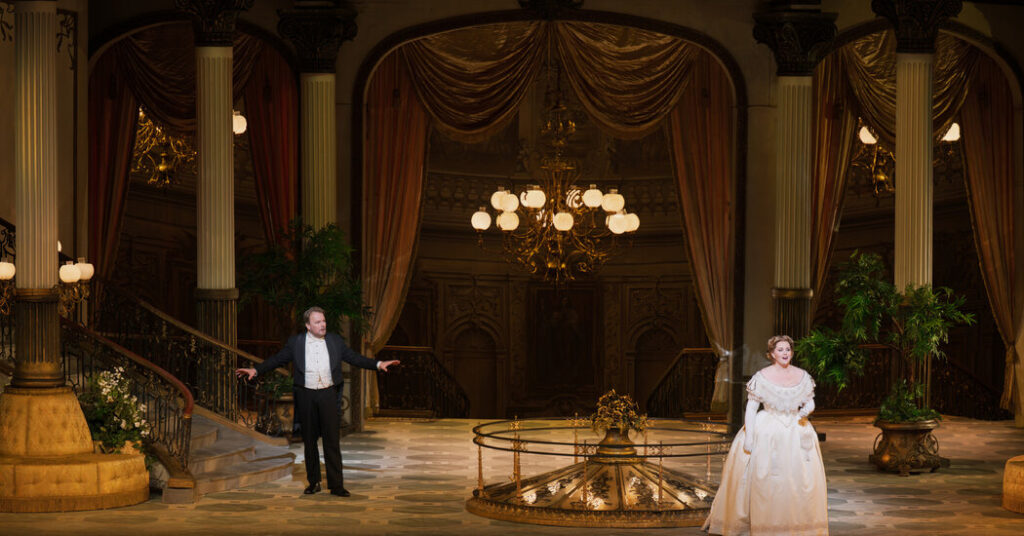The composer Richard Strauss and the author Hugo von Hofmannsthal had one of the great partnerships in opera. But eventually their collaboration showed signs of exhaustion.
For two decades they had worked together on hits like “Der Rosenkavalier,” which features the beloved Marschallin. She was so adored that she haunted Strauss and Hofmannsthal in 1928 as they created the heroine of “Arabella,” which is onstage at the Metropolitan Opera in a cozy revival through Nov. 29, with a Live in HD broadcast planned for Saturday.
“Everything is weaker and more conventional than in ‘Der Rosenkavalier,’” Strauss wrote to Hofmannsthal, “unless you can still succeed in making Arabella a truly interesting figure like our good Marschallin.”
In his reply, Hofmannsthal wondered whether he and Strauss had turned into an old married couple; perhaps, he wrote, he was no longer capable of exciting his partner. Then he went back to work, returning with the soliloquy “Mein Elemer,” which would inspire Strauss to write a reflective, soaring conclusion to the first act.
Strauss sent a telegram to Hofmannsthal with “warm thanks and congratulations” for the text. But the next day, Hofmannsthal was dead. He never got the message, and never heard the music for “Mein Elemer.”
That scene became the highlight of “Arabella,” but does it redeem the opera? That’s hard to say, mostly because the rest of it remains a sort of bizarro “Rosenkavalier,” even borrowing from its score at the mention of “beautiful roses.” There is a subplot about cross-dressing and gender panic. There is an orchestral passage that borders on musical pornography.
But where “Der Rosenkavalier” is shatteringly bittersweet, “Arabella” is light, the kind of romantic comedy more prevalent in operetta. There’s a reason one is more popular than the other.
“Arabella” was meant to be comforting, though. Hofmannsthal wrote its libretto in a nostalgic mode, setting the story in 1860s and revisiting Vienna under the Hapsburg Empire, which had collapsed at the end of World War I. The opera probably seemed even more quaint to its audience when it premiered in 1933, months after the Third Reich came to power.
Otto Schenk’s production at the Met, from the early 1980s, is also nostalgic. Its opulent, realistic sets could be period rooms on display in a museum. There is a disorienting sense of time travel to the whole thing, and a lulling smoothness to the muted colors throughout.
The performances in this revival were similarly neutral on Tuesday. Promising debuts came alongside mixed successes in the cast, making for an evening that was perfectly fine but rarely astounding, even as the conductor Nicholas Carter kept the opera moving with an impressive feel for dramatic elasticity and controlled sumptuousness.
One of the most exciting moments arrived in the second act, with the coloratura intrusions of Fiakermilli, sung by the soprano Julie Roset in her house debut. More than agile, her sound was acrobatic, confidently showing off vocal back flips with brightness and comedic charm.
Louise Alder offered another debut as Zdenka, Arabella’s younger sister, who because of the family’s poor fortunes pretends to be a boy named Zdenko. She mixed an amusingly frantic energy with a lovely soprano tone, gorgeous in an Act I duet with Arabella and irresistible alongside Pavol Breslik’s burning tenor as Matteo, a suitor of Arabella’s who ends up with Zdenka after a confusing night of passion.
Also delightful as a couple were the girls’ parents, Waldner and Adelaide, landed aristocrats who try to keep up appearances after he loses their fortune to gambling and she stakes their future on the readings of a fortune teller. The bass Brindley Sherratt and the mezzo-soprano Karen Cargill were characterful, bending their sound for effect and relishing physical comedy; she manically shook a table and he stuck out his tongue in greedy glee, and both times the audience laughed.
The central couple, though, are Arabella and Mandryka, a newly rich bumpkin who saves her family from financial despair. Tomasz Konieczny, whose resonant bass-baritone is always a welcome presence at the Met, lent the role an instantly persuasive authority despite the character’s bumbling nature, and he turned gracefully warm in the Act II aria “Ich habe eine Frau gehabt,” in which he shares his back story with Arabella.
And what of her? This role is new to the soprano Rachel Willis-Sorensen, and she seems to still be settling into it. Her eyes were often on the conductor, and although she has a naturally powerful instrument, it became temperamental at the top of its range. It also took most of the night to blossom with its full strength.
It’s encouraging that Willis-Sorensen found her footing by the third act, however, and just in time to provide the opera with the resolution it needs: a bit of happiness in a fading world.
Arabella
Through Nov. 29 at the Metropolitan Opera, Manhattan; metopera.org.
Joshua Barone is an editor for The Times covering classical music and dance. He also writes criticism about classical music and opera.
The post Review: A Cozy ‘Arabella’ Returns to the Met Opera appeared first on New York Times.




